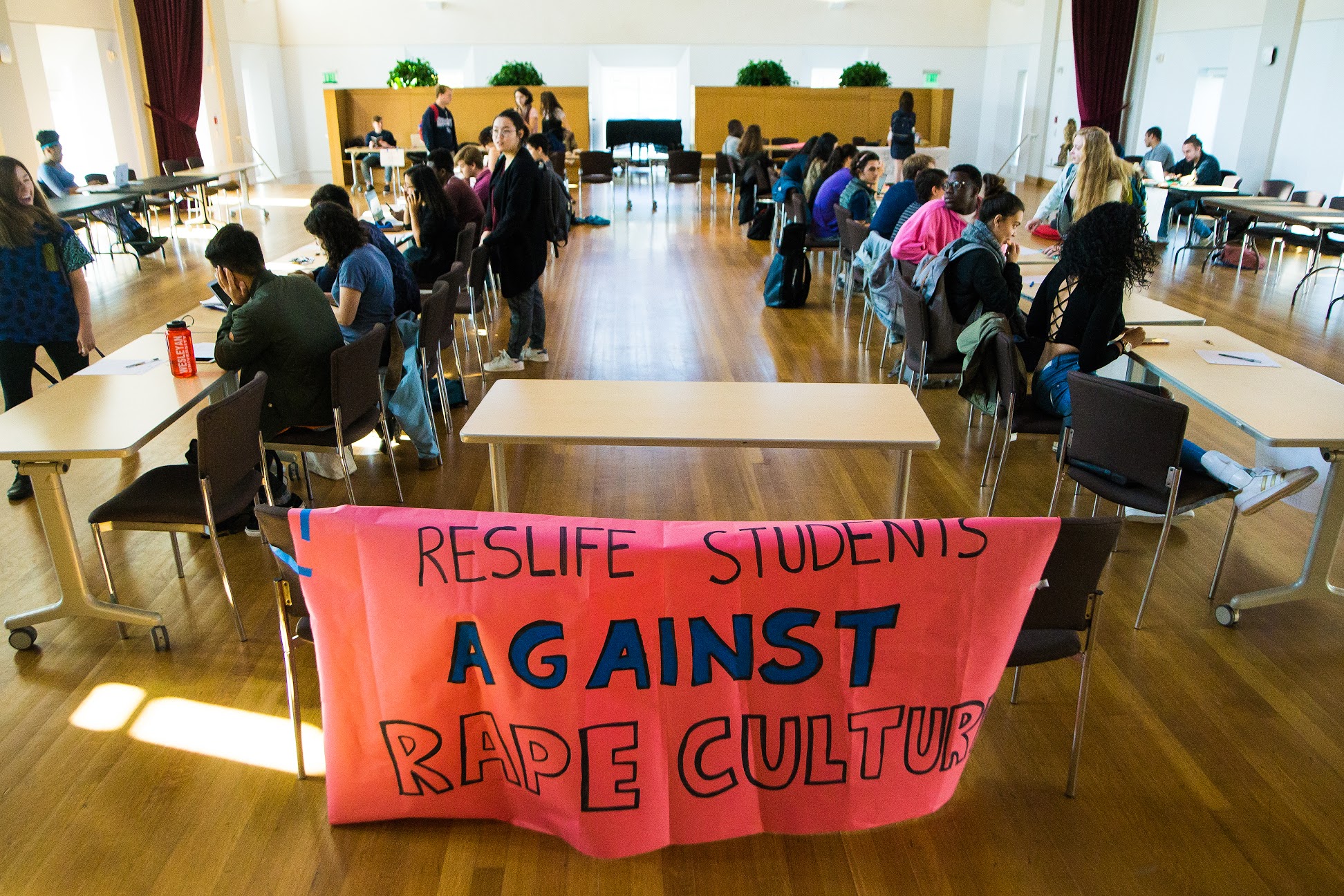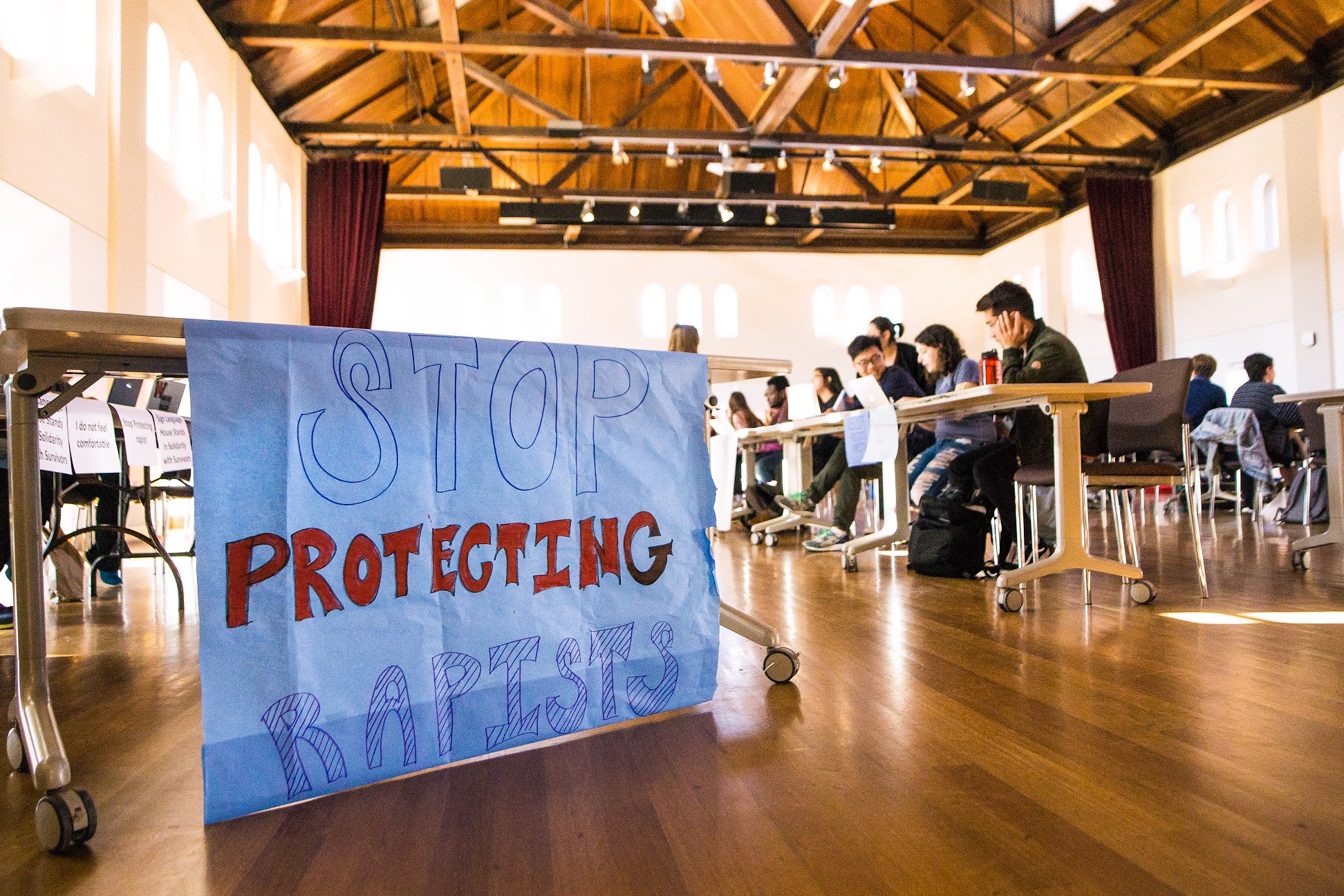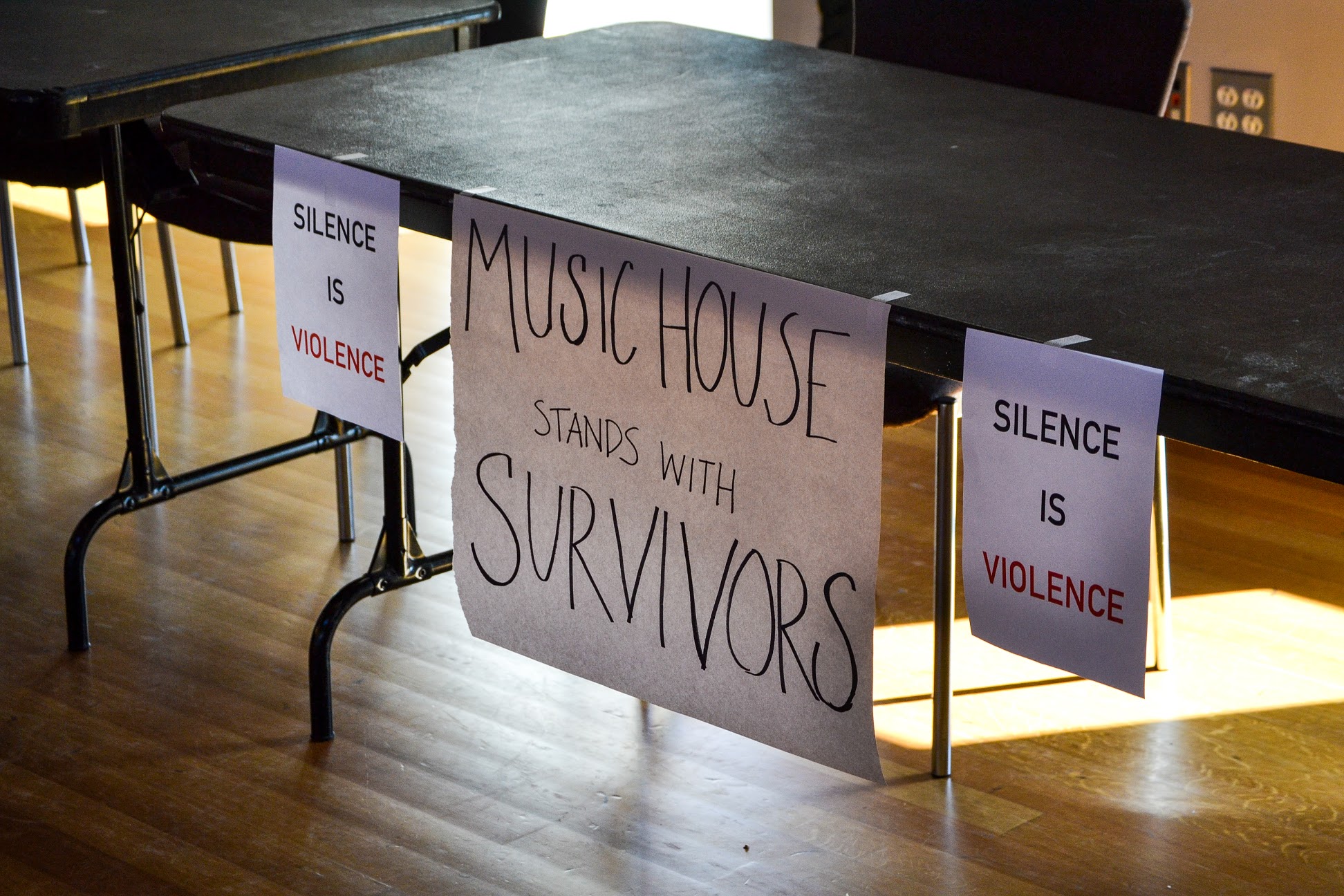
From the outside of Beckham Hall, not much seemed to be amiss at the annual program housing fair on Wednesday, Nov. 2. But inside Beckham, posters hung from almost every program house’s table protesting ResLife’s perceived failure to properly address concerns about a student ResLife employee, whom we’ll call Sam. At this point in time, Sam still remained in their post despite allegations of sexual assault. The following day, they would resign after almost a week of publicly voiced discontent from student staff members.
On Saturday, Oct. 29, several resident advisors (RAs) and head residents (HRs) contributed to an email chain circulated within ResLife voicing their concerns with ResLife’s neglect to take immediate action against the accusations of sexual assault.
“To find this out kind of at the same time as finding out about the administration’s neglect with Scott Backer did compound the effect that it had on me,” Tedra James ’18 said, who is the house manager of Womanist House. “It definitely made me feel unsafe to attend meetings with this individual, and it made me rethink what it means to be a part of ResLife staff and what it means to be a bystander when you are in that position.”
Evelysse Vargas ’17, the Head Resident for the Butterfields, has been critical of ResLife’s actions in the past few weeks. On Monday, Oct. 31, Vargas reflected on what she sees as ResLife’s failure to live up to its mission of supporting survivors.
“We go through training in how to deal with survivors, right?” she said. “The first thing we learn to say to survivors is, ‘I believe you.’ How am I supposed to say, ‘I believe you,’ and be okay with [Sam] still being my peer? That doesn’t add up. So that’s a massive discrepancy.”
Negotiating the risk
Many wondered why the accusations against Sam were not grounds for firing. Fran Koerting, Director of ResLife, explained that although the University is an at-will employer for University employees (meaning, essentially, that there need not be direct cause to dismiss someone from their post), the student staff of ResLife have a specific set of protections when it comes to dismissal.
“We would never fire student staff without cause,” Koerting said. “So yes, there’s this perception that we should have been able to fire [Sam] because people were telling us concerns. But that’s not the process that you follow for the student staff.”
An RA who preferred to remain anonymous, whom we’ll call Max, understood the legal component of ResLife’s choice not to dismiss Sam.
“To be honest, I’m not as resentful of ResLife as a lot of my peers,” Max said. “I think that a lot of it was their hands being tied because of the way that Title IX law is written….I think it’s silly for any of us to pretend that they just could have dodged a federal law.”
Vargas, however, wasn’t so sure.
“I understand Title IX limitations,” she said. “I understand that it’s a law that extends beyond the Wesleyan bubble. But I think, given our responsibilities, they should have taken that risk….This isn’t just a random person. This is someone who’s also on ResLife, and as ResLife staffers, we sign a contract to uphold a higher standard of citizenship.”
Owen Christoph ’18, the house manager of Open House, reflected on what he would have wanted to see from the central staff of ResLife.
“Well, originally I hoped that they would have taken action, maybe more informal action, without having to go through the whole Title IX process, but at this point, it seems there needs to be structural changes within ResLife, because it’s beyond this individual person,” Christoph said.
Structural concerns
In the days leading up to the individual-in-question’s resignation, Vargas estimated that 30 or 40 student staff members out of one hundred total were involved in protests. An anonymous house manager whom we’ll call Taylor shared her perspective on the variety of ways student staff members showed their discontent.
“A lot of people I know just tried to avoid [Sam],” she wrote in an email to The Argus. “Some were more willing to be confrontational by asking [them] publicly how [Sam] felt about the case filed against [Sam] and what all has been going on, but most I know have refused to meet with [Sam] and some have talked about going on strike by not filing paperwork for central staff.”
For Vargas, though, the scandal has far-reaching implications about what the makeup of the student ResLife staff means in terms of whose voices are heard and whose are privileged.
“The economics and dynamics of ResLife work in a way where black women are plentiful and come in droves and they apply,” she said. “So there’s a dispensability there, when there’s a lot of you applying. I think that has led to a general undervaluing of black female RAs. I just don’t think they care about us, quite frankly. You have four, five, six black women coming to you like, ‘This is a problem, what’s going on, you need to do something,’ and we’re falling on deaf ears. There’s nothing there. Nothing’s been done.”
For an anonymous student member of ResLife’s staff who worked last year on the south side of campus, this most recent incident was only the latest in a long line of insensitivity around sexual violence.
“[My area coordinator] brushed this case off referring to it as ‘drama’ which minimized the situation,” the employee wrote in an email to The Argus. “Sexual assault is never drama. It is not something to be brushed off and sometimes survivors of sexual violence seek justice through alternative methods that bring them peace but [the area coordinator] perceived their coping mechanisms which included social media shaming as drama. I think ResLife in this situation has adopted this mentality of minimizing sexual assault and thereby silencing the survivors.”
Despite the general tensions that continue to run between the ResLife student staff and center staff, Max said that some of Koerting’s words lessened his anger with ResLife.
“…The fact that [Koerting] was concretely like, ‘I believe the survivor, I’m waiting for written documentation so I can dismiss [Sam],’ to me felt like some sort of affirmation,” Max said. “I think this mitigated some of the anger that I was feeling towards ResLife up until that point.”
Zeno Scott ’18, house manager of Alpha Delt, emphasized the need for structural change.
“It is IMPERATIVE that [ResLife] make fundamental policy changes and MUST do so in conjunction with higher up admins AND invested/affected students/faculty/staff,” Scott wrote in a message to The Argus. “There must also be a reformation of Wesleyan’s Title IX office, whose bogus and perpetrator-protecting ‘investigations’ found ZERO people guilty of sexual assault/rape last year. Must more be said about the failure of said office/process? Wesleyan has completely internalized investigative procedure, emulating the strategies of big banks and police departments. There must be external investigation and adjudication. And there must be transparency.”
José Luis Sánchez ’18, an RA of Butterfield B, spoke optimistically about the continuation of the movement to reform ResLife.
“I feel like the students who actually cared about it, and the staff that actually really wants to create change around it, really still care,” Sánchez said. “I think…we never wanted a head. [Sam] was like the thing that started it, but what we wanted was structural reform [for] these rules that let people get off the hook for these things.”
Empathy and solidarity
Koerting explained that she empathizes with the difficulty of the situation.
“I really feel for both individuals that are involved,” she said. “I’m very concerned about the divisiveness within the staff. I think there’s a lot of friendships and relationships that have been strained because of it. I think there’s a lot of staff that probably feel silenced or caught in the middle. And I think for practically all of our staff, this is not what they thought their experience was going to be like, being on staff.”
Despite the turmoil of the past few weeks, one of Koerting’s goals is to ensure that student staff of ResLife learn and grow in their work.
“It’s wonderful, the things they do for their residents, but it’s also really important that they get something out of the experience personally, and grow from it,” she said. “And I don’t think any of them pictured that this was what the experience was going to be like. I’m really sad to see that that’s what’s going on right now.”
Residential Advisor for Butterfield B Ali Felman ’17 did feel supported, however, by certain members of central ResLife staff and recognized that many critiques of ResLife have to do with larger issues.
“Lil[iana Carrasquillo-Vasquez], my former Area Coordinator who recently assumed the role of Assistant Director, has been wildly supportive within the limits of her position,” she wrote in an email to The Argus. “So it’s not that all administrators are ‘bad,’ per se, or even that anyone is necessarily ‘bad’ (though there were some emails sent to student staff that are ABHORRENT)—it’s really a policy issue and a structural issue. ResLife is just a reflection of the larger social issues. But we can do better.”
Felman also reflected on the emotional burden of the allegations and ResLife’s response to them.
“Honestly, this issue has been very emotionally draining for me and many of my female colleagues,” she said. “….We CANNOT be a part of the statistics, just complacently accept that sexual assault just happens and it’s something we can’t avoid because it happens everywhere—but hopefully not to you!….We need respect in our individual interactions, and we need an administration that really listens to the voices of survivors, though ours are growing hoarse from years of screaming.”
Grace Handy ’18, a house manager who feels, in her words, “completely disillusioned” with ResLife, has found solace in the ways in which student staff members have come together in solidarity.
“ResLife student staff has provided tremendous support for one another,” she wrote in an email to The Argus. “We have reached out to each other to check in throughout and created stronger relationships through this difficult and painful situation, evidence of a systemic issue with the way ResLife and the broader Wesleyan administration deals with sexual assault….The solidarity, support and love from student staff has what has gotten me through these past few weeks.”
The view from the other side
In seeking Sam’s side of the story, we received three anonymous statements of support. The first addresses what they see as the danger of such accusations.
“Students are getting involved with the case and making accusations without hearing both sides of the story,” the statement reads. “This is incredibly dangerous. People are generalizing groups of individuals that are associated with those involved. It is unbelievably harmful to wrap in third parties without knowing any facts.”
The statement concluded with a final note of support for Sam.
“On top of this, the individual in question has had [their] tires slashed, causing the surrounding community to also feel very much threatened,” it reads. “Through all of this, [they have] remained calm and kept to [them]self. [They have] not shown any aggression, hatred, or violence toward any of [their] accusers in any way. And truthfully, I think that takes an extraordinarily strong person to do so.”
According to Koerting, central staff have been transparent in their handling of the issue. Koerting says she has known about the allegations against Sam for over a month. She listed the components of the response.
“Clarifying that we have a process in place that we follow, which is in their handbooks, that we would not just fire someone without cause—that this is how we handle situations,” she said. “We know what the specifics are with the situation; we ask the person for their response to it; we make a determination.”
Another anonymous commenter came to Sam’s defense by invoking the vigilante efforts to retaliate for Sam’s perceived assaults.
“There are two sides to every story,” the statement reads. “Many people have decided to take matters into their own hands through physical harassment and verbal abuse assuming that the particular individual is guilty until proven innocent….This statement is by no means trying to delegitimize what the survivor’s story or experience but I just want people to know both sides of the story before forming preconceived notions and taking action for what they think happened.”
A final statement of support for Sam reiterates other supporters’ opinions and invokes Sam’s resignation.
“I do not presume to know anyone’s guilt or innocence, but I do know that these reactions are all based on accusations,” reads a final letter. “[They have] been publicly shamed, stalked and recorded and had [their] personal property damaged such as [their] tires slashed. ResLife also pressured to [them] to resign from [their] job….There seems to be no respect for due process and it pains me to see this and it is unfair to treat someone like they are guilty until proven innocent as opposed to the other way around.”


Leave a Reply